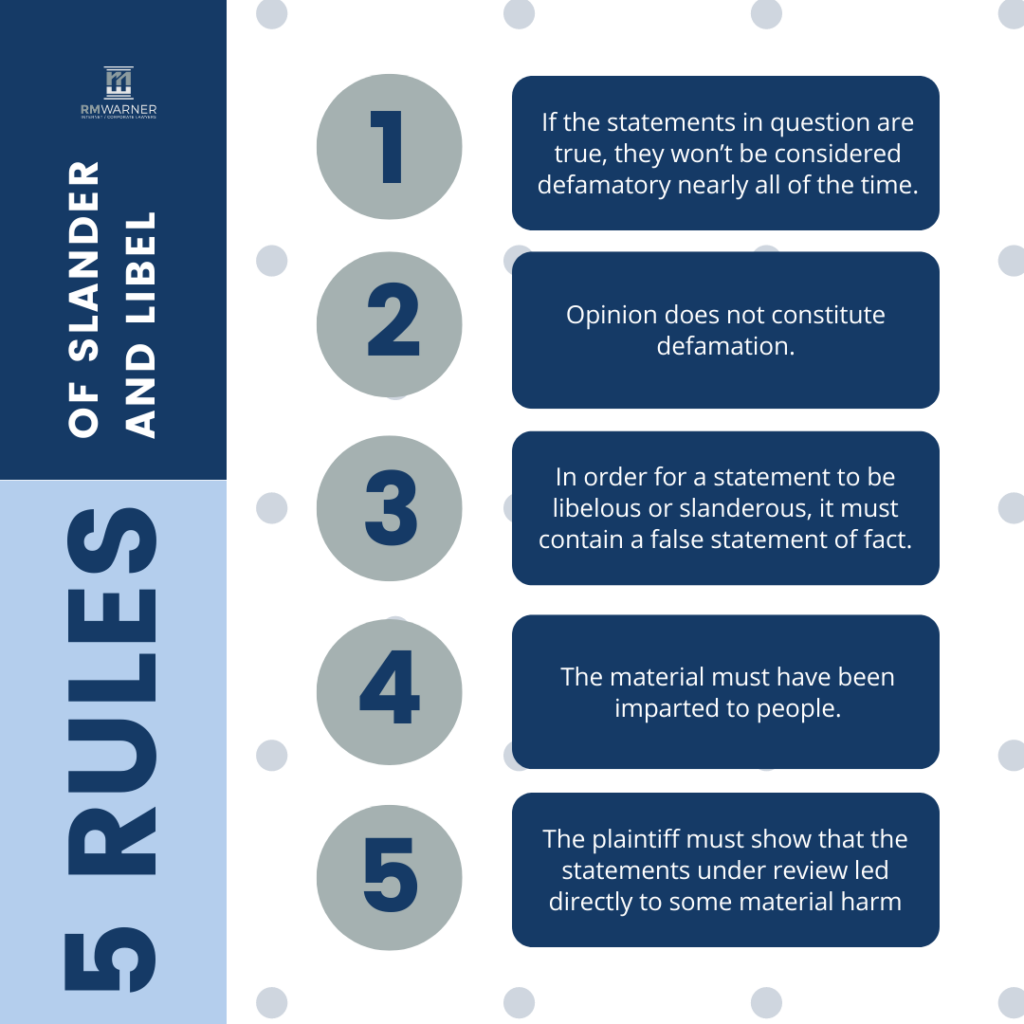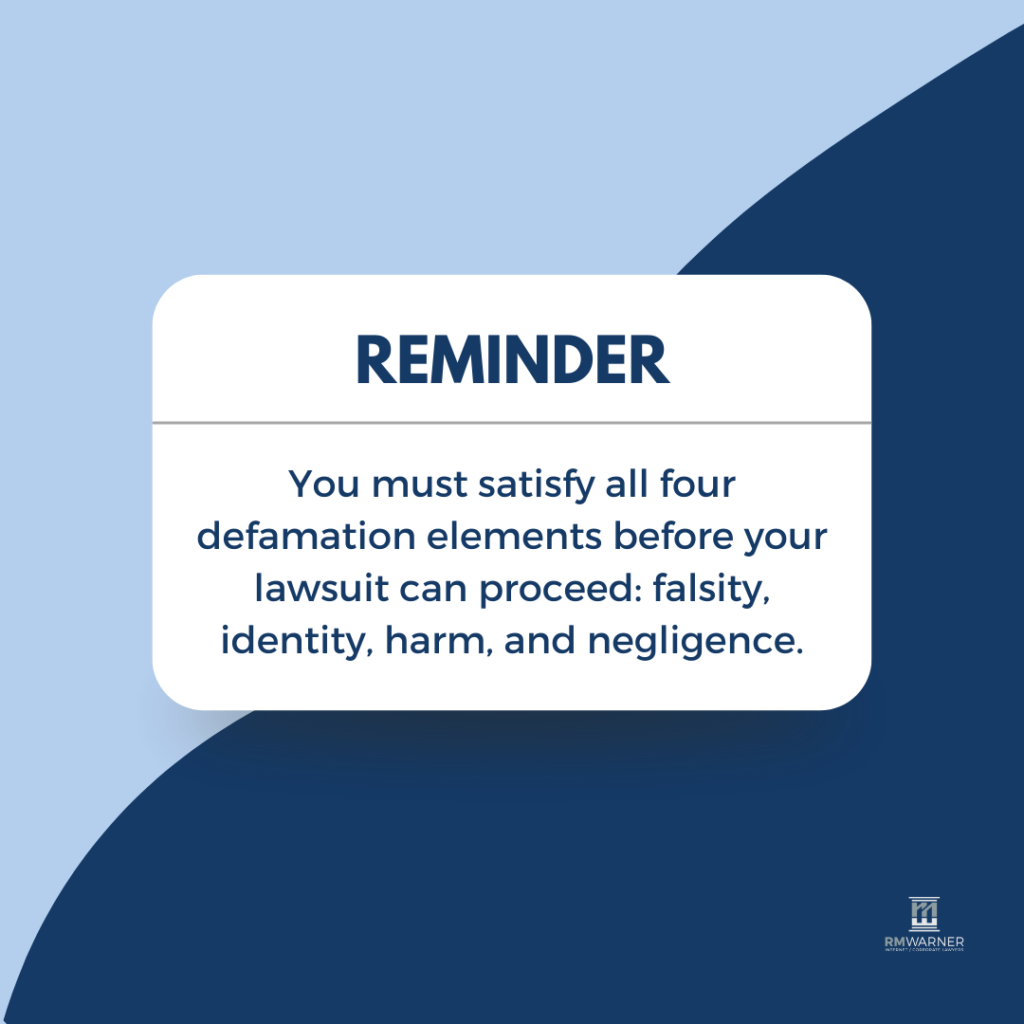While the internet provides a great platform to connect with others and market your business, it also exposes you to unwarranted and potentially harmful statements. These statements can ruin your company’s reputation and lead to loss of business.
If you find yourself a victim of one of these posts, it can be difficult to determine how to file a defamation claim. This article will define internet defamation and discuss who to hold accountable and where to file your claim. If you have further questions, contact an RM Warner Law experienced internet defamation lawyer to discuss your case further.
 What is Internet Defamation?
What is Internet Defamation?
Internet defamation constitutes false, published statements made to a third party via a website or a social media platform that have the potential to damage one’s reputation. These statements often arise from negligence or malicious intent. Like individuals, businesses can sue for defamation through specific claims referred to as trade libels.
For a perpetrator to be liable for internet defamation against your business, you must prove that their statements were:
- False: The suing party must establish that the statements are false. Your claim won’t succeed if the defendant’s statements are true or are protected opinion.
- Made with Fault: You must demonstrate that the perpetrator acted irresponsibly and unreasonably when they made the statements. The legal standard is negligence. For example, if the defendant is an organization, it’s reasonable to expect them to fact-check before publishing controversial comments.
- Expressed as Fact: For statements to be ruled defamatory, you must prove that they were presented as facts and not as opinions. Facts are statements that can be proven or disproven.Calling someone an idiot is not a fact that can be provide. But accusing someone of rape is. Sometimes, opinions can be considered presented as facts if a reasonable person would have interpreted them as such.
- Published: Proving that statements were published isn’t difficult in internet defamation cases as long as you can print them out or otherwise show that the content was on the social media platform or website.
- Damaging: For your internet defamation case to succeed, you must demonstrate that the defamatory statements damaged your business or your personal reputation in some way. Show that the damage was quantifiable, significant, and documented using records reflecting loss of business or declining profit from when the statements were published.
Who Do You Sue for Internet Defamation?
Many businesses that have experienced online defamation often begin cases to sue the website or internet service provider (ISP) that hosts the defamatory content. This is because these companies are usually wealthy and can afford to pay the damages. In the US, however, pursuing a website host or ISP in a defamation lawsuit is not a legal option. Section 230 of the Communications Decency Act prevents courts from treating social media platforms, ISPs, and website hosts as the publishers of statements made by content providers. If you plan to file an internet defamation lawsuit, file a claim against the entity or person who made the defamatory statement, not against the website or social media platform. To be clear, you cannot sue Facebook, Instagram, Tiktok, or YouTube for defamation.
 Where Do You File an Internet Defamation Suit?
Where Do You File an Internet Defamation Suit?
You can file your defamation claim in a state or federal court where:
- The defendant lives
- You live, if the defendant has made sufficient contact with the state to defame you
- Your business operates, if the defendant has made sufficient contact with the state to defame you
- Your customers reside (assuming they read the publication)
- You have experienced damage because of the defamation
Before choosing one court over the other, it’s crucial to consult an internet defamation lawyer. An attorney will consider all factors and advise you on which court may be favorable for your case.
Are You Looking for an Internet Defamation Lawyer?
If your business has been defamed online and you want to take legal action against the perpetrators, contact us at RM Warner Law.
Our internet business lawyers have a proven track record of helping businesses remove defamatory content from the internet, conducting investigations to identify anonymous internet perpetrators and holding them accountable for their actions. Our strong team of internet attorneys will achieve these results as quickly and efficiently as possible without drawing more unwarranted attention to your business.
Call us on our toll-free number 1-866-570-8585 or fill out our contact form to discuss your case.





Leave a Reply
Your email is safe with us.